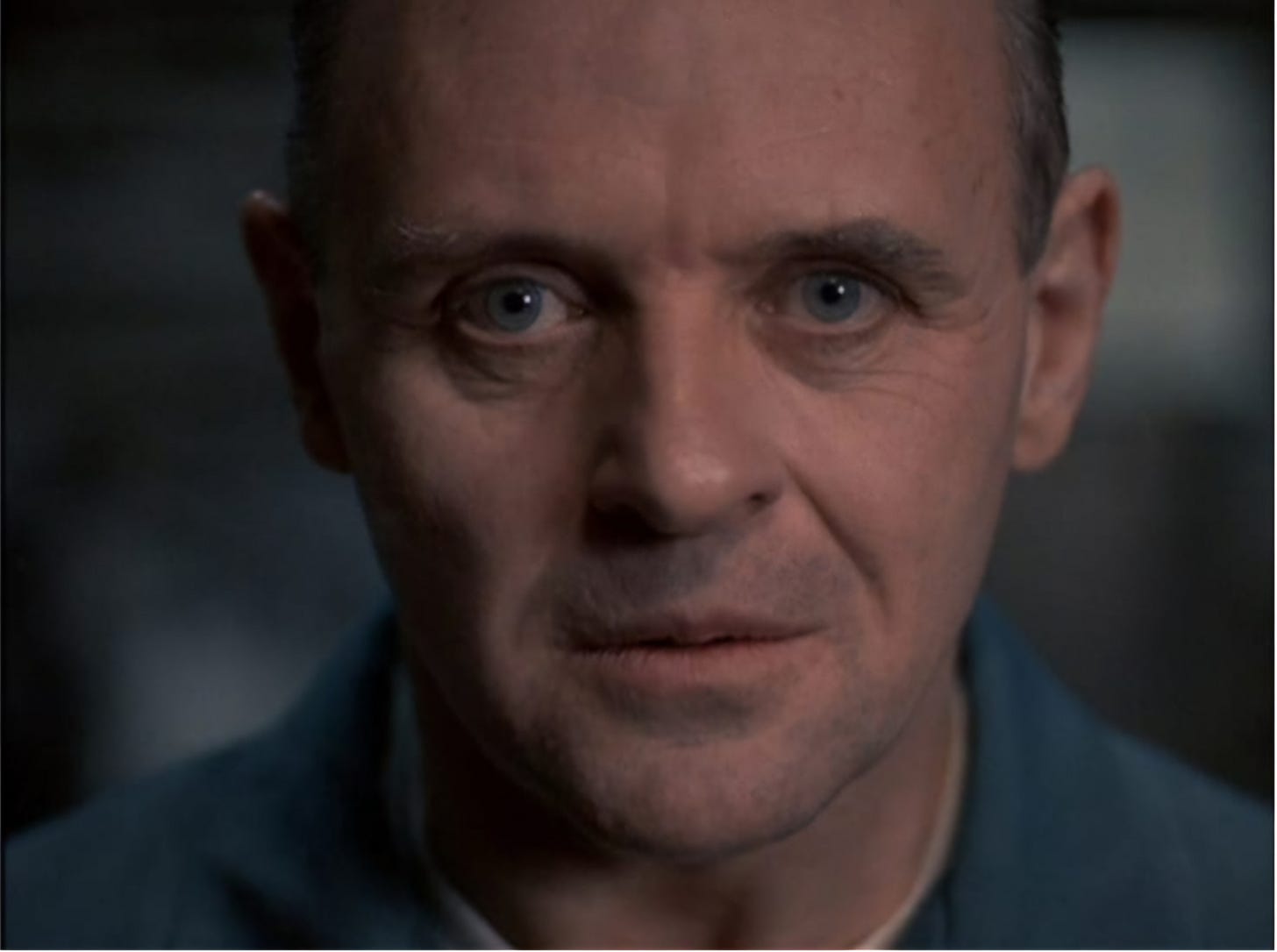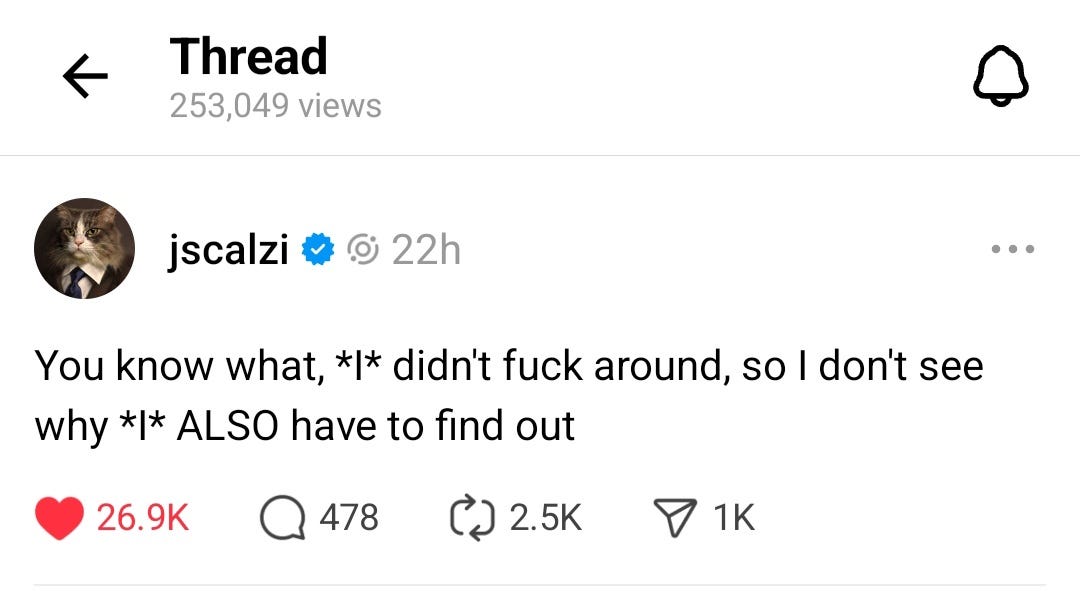Hannibal Lecter was Based on a Real Person
Hannibal Lecter was based on a real person.
It’s always terrible when the worst person ever is right about something. Thankfully, this time Donald Trump was only partially right. The Silence of the Lambs is not a true story, nor based on one. But the fictional character of (“the late, great”???) Hannibal Lecter was indeed inspired by a real person.

The Silence of the Lambs, that iconic 1991 Oscar-winning film, was based on a novel of the same name, written by Thomas Harris. Thomas Harris was born in Jackson, Tennessee in 1940, but spent most of his childhood in Mississippi. He studied English at Baylor University in Waco, Texas, and upon graduation in 1964 he worked for a local newspaper, the Waco Tribune-Harold. He covered the police beat. A few years later, he moved to New York to become a crime reporter for the Associated Press.1 By 1978, Harris had recently left journalism to write novels full time, but he still paid special attention to a particular high-profile criminal trial occuring in Florida.
The defendant? Ted Bundy.
In 1981, Harris debuted his Bundy-inspired creation, Dr. Hannibal Lecter, aka Hannibal the Cannibal, the former psychiatrist imprisoned for killing and eating his patients, in his novel Red Dragon. He followed up with a more Lecter-centric and more famous novel, The Silence of the Lambs, in 1988. The novel was optioned, the movie was made, the rest is history. History now includes America electing, by a small margin, a presidential candidate who wouldn’t stop making deranged comments about Dr. Lecter, including that he (apparently?) thinks The Silence of the Lambs was true.
Conservative movie critic and radio host Michael Medved hated The Silence of the Lambs when the movie was released in 1991. In 1992 he wrote an entire book-length screed about the supposed evils of Hollywood, and dedicated a disproportionate amount of pages to his hatred of this film. Which is fine, in a way; we’re all allowed to hate a movie. But his chief complaint was that cinema is supposed to reflect our culture and humanity back to us, and since when do successful practicing psychiatrists go around killing their patients only to serve their livers at fancy dinner parties. And okay, fine, perhaps not literally. I sincerely hope not literally! But that’s not the point of Lecter’s story. What Medved either refused to interrogate, or saw quite clearly and decided a reactionary whine-fest was preferable to grappling with truth, is that Hannibal Lecter is more real than we know.
The vast majority of fictional serial killers are based on real human ones. But probably more worrisome to Medved than the real-life inspiration for Lecter is the attractiveness of Hannibal. As horror essayist Peter Counter sums up beautifully: “Hannibal Lecter liberates us from the oppression of normative, naive society.” Lecter lives in the truth of disorder; he normalizes and romanticizes the realness of trauma.2 He doesn’t shy away, instead allowing his audience to, again to quote Counter, “acknowledge the bad dream state of the world, with its unspoken horrors that are swept under the rug by institution, social order, and law.” This is, I believe, a significant part of Donald Trump’s appeal, too.
Trump behaves badly and gives people permission to do the same. Trump validates people’s feelings about the state of the world, and gives them permission to prioritize their feelings over facts and reality. He embodies evil and chaos and puts it on display, daring us to blink first. Hannah Arendt wrote about the banality of evil, how it is all around us, unremarkable, and readily accepted by everyday citizens far too often. To his credit, Medved was one of the few conservatives who refused to buy Trump’s sales pitch, even going so far as to publicly endorse Kamala Harris for president. Perhaps he just doesn’t want to see it either.

Donald Trump is now Joe Biden’s legacy. History will always ask - angrily, incredulously - why his Justice Department didn’t prosecute the demagogue who tried to overthrow the government, why President Biden actively engineered the opposite outcome. History will also mark his egotistical refusal to step down in time as part of why Trump got a second foothold on our country. Despite personally hating this election outcome, I believe Kamala Harris did an admirable job. She was tapped at the last minute to clean up a mediocre white man’s mess; and sometimes, it just can’t be done. Sometimes, the ask is impossible. Sometimes, the math doesn’t math. It’s probably not healthy to call her campaign perfect, so sure, maybe she could’ve tweaked a few choices on the margins of it. But the fault doesn’t really lie with her. She did everything she could, and she just couldn’t get the stink of Biden off her. That there was stink in the first place is on Biden, not her. Maybe this will finally break the cult of Biden? His legacy is firmly planted as one of history’s villains now.
I wrote some about joy when Kamala Harris became the Democratic presidential nominee. The gigantic enthusiasm boon we all saw when Biden dropped out was real. I hoped beyond hope and, after seeing the final Selzer poll, let myself actually believe that would translate to Trump’s final defeat. Perhaps I projected some of my own personal feelings onto my interpretation? The recent years have been rough on me in certain ways, and I've been beyond eager to turn the page. I don’t know where this election leaves us. Is it ethical to find joy and beauty in what are likely dark times ahead?

My perception thus far - which could easily be proved wrong, depending on specifics of what Trump can do in office (including, you know, stay alive) - is that there won’t be a large and largely visible resistance. We’re just too tired of this shit. The people who fucked around can find out on their own. They can taste some of that juicy personal responsibility they supposedly care so much about. Enjoy your tariffs. I think there will be resistance, but it’ll be quieter, and centered around community, care, rest, and art.
In her futuristic novel Parable of the Sower, Octavia Butler wrote that an essential component for demagogues is what she terms their “bread and circus.” They give bread to their inner circle (tax cuts for the rich, rewards for corporate avarice, etc) and give circus to the media and the public: the scandals, the antics, the calling Hannibal Lecter a real person. The circus is the planned distraction from the bread. The mainstream media is counting on Trump’s circus to push eyeballs and clicks and thus, profit, to their tills. That’s a lot of why they sanewash him so much, they were desperate to get him back. I doubt they’ll get the circus they want, though. No one is curious about why Trump is the way he is anymore, nor is anyone shocked by his antics any longer. We’re just disgusted by him. CNN and MSNBC have already, just since the day after the election, seen their viewership rates drop precipitously. I know nothing for sure, but for now I’m perceiving that liberals and leftists will focus much more on locking into their communities and ring-fencing the vulnerable as much as possible, rather than protests and voting. We no longer trust the Democratic Party to get rid of Trump, as they promised.
At the end of the day, the Democratic Party’s only real sales pitch is harm reduction. While I yearn for them to do more, this argument absolutely does work on me! I want to minimize suffering at every turn, that’s a moral I hold dear. But this may just place me in a minority, at least within the United States. It’s become clear over my adult life that harm reduction by itself, in and of itself, isn’t convincing to much of the rest of the population. For about a third to half of the country, it’s an actual turn-off - they seem to enjoy hurting “others.” And for millions of others, it’s simply not enough. They’ll stay home. And that’s why my guess is that most Democratic presidential candidates, and the party as a whole, won’t make much headway until they embrace a more Keynesian economic policy, combined with a civil rights platform, a sort of New Deal tailored to the 21st century - and begin to follow through on it. Neoliberalism is simply not appealing. And at this point, we’ve all been harmed by it. My guess is that the Democratic party as a whole will continue to struggle electorally until a real economic shift occurs.
Here’s some dinner party trivia for you: Nicholas Pileggi, author of the mafia exposés Wiseguy and Casino, the former of which became Martin Scorcese’s Goodfellas, was one of Thomas Harris’ coworkers at the AP
Viewers of Silence easily catch the romantic overtones between Lecter and Clarice Starling, and they’re not wrong. If you want to know how that story ends, read Thomas Harris’ sequel Hannibal. But don’t watch the movie - they changed a key plot line in this regard, a move that, for what it’s worth, Anthony Hopkins much disagreed with
SOURCES:
“The End of Evil” by Sarah Marshall, from Unspeakable Acts: True Tales of Crime, Murder, Deceit, and Obsession, edited by Sarah Weinman
Be Scared of Everything by Peter Counter
“Why is Trump So Obsessed with Hannibal Lecter?: A Complete Timeline” by Miles Klee, Rolling Stone, July 30, 2024
“How Thomas Harris Defined a Genre and Created Fiction’s Most Likeable Villain” by Tom Tivnan, Penguin UK, May 15, 2019



